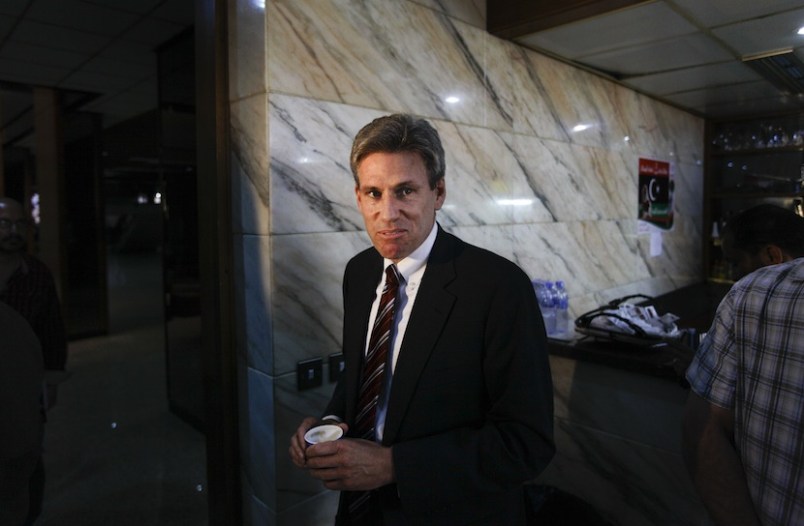The foreign policy community in Washington, D.C. came together Wednesday to mourn the death of Ambassador Christopher Stevens, who was killed along with three other American diplomatic officials in a fiery attack on the U.S. consulate in Benghazi, Libya.
Anne-Marie Slaughter, a former top State Department official under Hillary Clinton who is now back at Princeton, effusively praised Stevens and his work.
“He represents the very best of the foreign service: selflessness, dedication to duty, and a passion for the people and countries he worked in,” she told TPM. “He died in the service of his country, but also in the service of a free, peaceful, and prosperous Libya. We can honor his life’s work by doing everything we can to strengthen the hand of those forces within Libya who seek to stay true to the ideals of the revolution.”
President Obama praised Stevens and his colleagues who died in the attack while speaking Wednesday afternoon to a crowd of several hundred State Department employees in Foggy Bottom, according to a White House pool report. He talked about the importance of foreign service, saying he personally appreciates its value having grown up abroad for some years.
“I’m personally aggrieved,” Wendy Chamberlain, president of the Middle East Institute and former U.S. ambassador to Pakistan, told reporters in a conference call Wednesday afternoon. She called Stevens a “rising star” among American diplomats.
“I think that the death of Chris Stevens is tragic and reminds people that diplomacy abroad can be highly dangerous — that creating democracy out of all the threads that are raw and laid bare after revolution is extremely hard work,” Steve Clemons, a foreign policy expert in Washington and acquaintance of Stevens’, told TPM.
“I think Chris’ death is a reminder that nation building and intervening in other countries is nothing to be giddy about,” he said. “We owe diplomats an enormous debt of gratitude.”
Clemons also praised the work Stevens did for the U.S. mission in Libya. “Chris laid all the groundwork,” he said. “To some degree Chris Stevens was a hero himself of Libya’s step forward.”
Joel Rubin, the director of policy and government affairs at the foreign policy organization Ploughshares Fund, recounted his memories of Stevens in a blog post.
“I first met Chris when he served as a congressional fellow in the U.S. Senate working for the Foreign Relations Committee,” Rubin wrote. “He was a career Foreign Service Officer and a former Peace Corps Volunteer, meaning that he lived his life promoting American values and ideas around the world. While I was a Democratic Senate staffer and Chris worked for a Republican member, it was clear that those values infused his every move. He wasn’t partisan; he worked across the aisle; he was professional and kind. And above all, he was friendly. Friendly to me and friendly to my wife, alongside whom he worked. Everyone liked Chris.”
At Foreign Policy magazine, managing editor Blake Hounshell offered his thoughts on Stevens, his sacrifice and what his tragic death signifies.
“Stevens was by all accounts a popular diplomat, having established the U.S. presence in Benghazi during the war and been an avid supporter of the opposition,” he wrote. “For me, the embassy assaults are a sobering reminder not only of the deep anger and dysfunction that plagues the broader Middle East, but of the enormous difficulty the United States has in dealing with this part of the world.”






